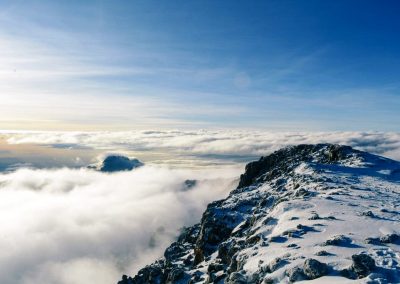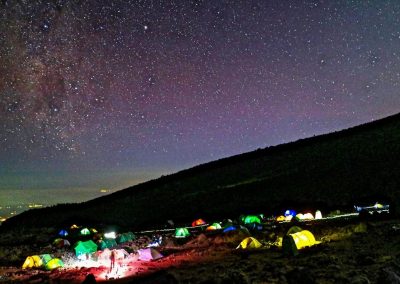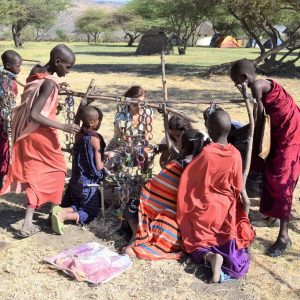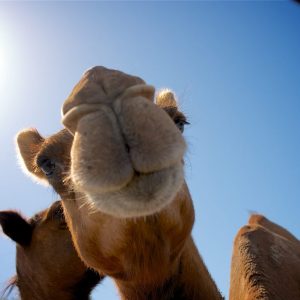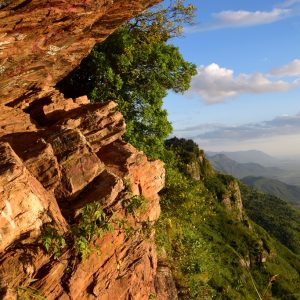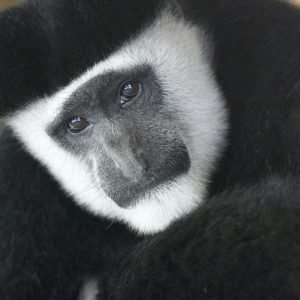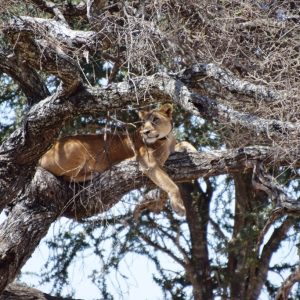7 Days Kilimanjaro Rongai Route (6 days possible)
- Great way to see wildlife such as elephants, buffalos, antelopes
- The route starts flat and offers easy treks with good views of Kibo and Mawenzi
- Since the ground is drier, this climb is more suitable for the rainy season
Tour FAQs
- Overview
- Itinerary
- Circuit / Region
- Included Services
- Excluded Services
- Options
- Rates
- Best Time To Travel
- Packing Tips
- Notes
The Rongai Route is one of the simpler routes that gradually approaches the summit and starts in the north of Kilimanjaro near the Kenyan border. Before that, the way to register is at Marangu Gate. This route is used only for ascent, the Marangu route for descent which offers an additional variety. Even if the landscape on this route is not as impressive as on others, you hike through pristine rainforests and you have the possibility to enjoy African wildlife here. There are only a few hikers on this route, only from the Kibo Camp does the route mix with the Marangu Route. The paths are easy to walk and very dry, because the north side of Kilimanjaro generally has less rainfall, which makes the route a good alternative even in the rainy season.
Due to the fact that the Rongai route is a moderate route, it is especially recommended for those with less experience in hiking. Nevertheless, this route should not be underestimated and requires sure-footedness and fitness. The tour can be done in 6 or 7 days, whereby the 7 day route offers a maximum time for acclimatization.
Short Overview
Day 1: Rongai Gate - Rongai Cave
1.950 m / 6,398 ft - 2.750 m / 9,300 ft
Duration: 3 - 4 h
Day 2: Rongai Cave - Kikelewa Camp
2.750 m /9,300 ft - 3.600 m / 11,811 ft
Duration: 6 - 8 h
Day 3: Kikelewa Camp - Mawenzi Tarn Hut
3.600 m / 11,811 ft - 4.300 m / 14,160 ft
Duration: 3 - 4 h
Day 4: Acclimatization day / Mawenzi Tarn - Mawenzi Ridge - Mawenzi Tarn
4.300 m / 14,160 ft - 4.390 m / 14,400 ft - 4.300 m / 14,160 ft
Duration 3 – 4 h
Day 5: Mawenzi Tarn Hut - Kibo Camp
4.300 m / 14,160 ft - 4.700 m / 15,430 ft
Duration: 5 - 7 h
Day 6: Kibo Camp - Uhuru Peak - Horombo Camp
4.700 m / 15,430 ft - 5.896 m / 19,341 ft - 3.720 m / 12,250 ft
Duration: 11 - 14 h (up 6 - 8 hours, down 5 - 6 hours)
Day 7: Horombo Camp – Marangu Gate
3.720 m / 12,250 ft - 1.870 m /6,046 ft_
Duration: 4 - 5 h
Detailed Itinarary
- Day 1 Arrival and transfer to your accommodation in Moshi
Welcome! Karibu sana! – Today you will be picked up at Kilimanjaro International Airport or Arusha Domestic Airport and then taken to your accommodation in Moshi. The drive from Kilimanjaro Airport to Moshi takes approximately one hour.
We meet in the hotel for a short preparatory talk.Meal plan: dinner (depends on arrival)
Possible accommodations: Salinero Hotel or Parkview Inn
- Day 2: Rongai Gate to Rongai Cave
After breakfast we drive to the National Park Gate just before the Tanzanian / Kenyan border, which is located on the northern flank of Kilimanjaro. After registration, the hike begins on a forest road through maize and potato fields, before going steadily uphill through the forest. Here you can discover a variety of animals, such as the black and white colobus or colobus monkeys in the tops of the trees. - Day 3: Rongai Cave to Kikelewa Camp
In the morning you continue to climb steadily to the second cave (3.450 m 11.320 ft). It is usually clear in the early morning and as you ascend over the moor- and heathland you should have good views of the Kibo, the eastern ice fields and to the left to the rugged peak of Mawenzi. We leave the main route and turn onto a smaller path across the moorland towards Mawenzi. The path winds steadily uphill over several mountain ridges and small valleys. The campsite is located in a depression near the Kikelewa Caves. - Day 4: Kikelewa Camp – Mawenzi Tarn
Today's hike takes us a short, steep stretch up a grassy slope with superb views of the mountain. We leave the moor landscape behind us. Now we are so high that the landscape is starting to look a bit bare. The vegetation is losing its color and the soil is more and more barren. We have reached the Alpine Desert Zone. The hike takes us in only a few hours to the tarn which is located in a circle directly below Mawenzi. After this hort hike you can rest in the afternoon. We will camp here for two nights. - Day 5: Acclimatization day / Mawenzi Tarn to Mawnzi Ridge back to Mawenzi Tarn
This is an extra day meant for acclimatization and can be spent day hiking on Mawenzi Ridge. The unique landscape offers motivating views of Kibo and Mawenzi. After spending a few moments exploring the area we head back to Mawenzi Tarn for camp. - Day 6: Mawenzi Tarn Hut to Kibo Camp
We hike over the Kibo saddle, which lies between the two volcanoes Mawenzi and Kibo. When crossing the alpine desert of the saddle, you have a wonderful panoramic view and you have the Kibo in front of you all day long. Finally, you can also see the path that winds its way up the slopes of the mountain to the summit. Shortly before today's destination, it goes steeply uphill again over rock passages. The camp for the coming night is between large boulders, the school hut.
Upon reaching our camp you will spend the day in preparation of the final ascent after a very short night! - Day 7: Kibo Hut to Summit and descend to Horombo Hut
Wake up around midnight for the final ascent to Uhuru Peak, the roof of Africa. After a five-hour hike with a rest at William's Point, about two hours from the Kibo Hut, you reach Gilman's Point at 5.681 m (18,638 ft) on the crater rim with the first rays of sunshine. The glittering red sun reflects the ice fields and the rugged peaks of the Mawenzi. Although this is considered the easiest of the three crater ascent paths, it is still extremely difficult.
The hike from Gilman's Point to Uhuru Peak is a gradual climb and not very difficult. However, the altitude makes the hike long and tiring. The crater rim hike takes about two hours. After reaching Uhuru Peak enjoy this magnificent moment on the roof of Africa! Congratulations! Hongera! You have conquered the highest peak in Africa! Then take photos of your guide and group before descending to the Horombo Hut.
On the way down from the summit, you will have magnificent views. Stop for a short break with some snacks at Kibo Hut before continuing to Horombo Hut. Reach Horombo Hut in the afternoon and enjoy your last night on the mountain. - Day 8: Horombo Camp to Marangu Gate
After breakfast, finish the trek with a descent to Marangu Gate. Your last hike on Kilimanjaro is a beautiful one, passing through Kilimanjaro’s cloud forest. Watch your step during the descent, as the trail can be slippery. Once at the park headquarters at Marangu Gate, we collect your summit certificates. There our vehicles are waiting to take you back to Moshi or Arusha.
- Transport from and to your hotel/residence or Airport/seaport
- First night in Moshi
- Private English-speaking Professional mountain guides
- Guides, Porters, cook salaries
- All park fees
- Rescue fees
- All meals while on the mountain incl. filtered Water, tea & coffee
- Government taxes, VAT and All relating service charges
- First Aid Kit & summit Oxygen
- Hot Water for washing
- Sleeping tent
- Mess tent
- Table and chairs
- Sleeping form mattress
- Emergency evacuation by Flying doctor
- International/national flights and visa fees
- Tips for guides and support staff
- Sleeping bag, mat and personal items for the hike (please have a look at our packing list). Almost all equipment is available to rent from our team in Tanzania if required.
- Bath towels
- Private portable toilet and privacy tent
- Personal expenses (airport taxes, Internet, soft
- and alcoholic drinks, snacks, laundry etc.)
- Government-imposed increase in taxes and/or park entrance fees
- Anything else not mentioned in the inclusions
- This route can be done in 6 days but it is advised to take an extra day for acclimatization
- On request other tour languages possible
- Additional accommodation after the tour can be arranged for an extra cost
- Extension of the tour or an additional program is possible or have a look at our other offers
- Between January and March the temperatures are mild, the weather in the morning and afternoon is nice and the visibility of the mountain is particularly good
- In June and July the sky is clear and the nights are cold
- August, September and October are the warmest months to climb Kilimanjaro
- Rainy season: Late March to mid-May and November and December. There is snow in the higher elevations
Please follow the list below to ensure your comfort. You will have a better vacation if you are prepared.
But please note that this list is not exhaustive!
Almost all equipment is available to rent from our team in Tanzania if required. Please talk to us in advance for further planning.
The climb to the summit of Kilimanjaro leads through four climatic zones. Therefore, the weather can range from warm and tropical at the base of the mountain to freezing on the summit and the temperatures can range from + 20 ° C down to -15 ° C.
Cotton should be avoided as it is hydrophilic, which means it absorbs moisture and blocks breathability.
Since June 1, 2019, Tanzania has been banned from using single-use plastic bags. If you want to separate items in your bag, please use re-usable "packing cubes". Please also note that disposable plastic bottles are not permitted on Kilimanjaro.
Please note that your large backpack can weigh a maximum of 20 kg. This is the maximum permissible weight that a porter can carry. This weight limit is checked at the hotel pickup.
To carry your most important belongings with you, a 20 - 40 l daypack is best. You should pack your backpack very carefully and not carry too much with you, because at altitude you need all the strength for your ascent.
Basic Equipment
- Daypack 30 – 40 L (for your personal belongings, you need to carry it yourself) + rain cover
- Duffle bag or backpack (60 – 80 L / maximum weight 20 kg/carried by the porter) + rain cover
- Sleeping bag (possible to hire from our team in Tanzania)
- 1x mat/sleeping pad – to protect from hard and cold underground (possible to hire from our team in Tanzania)
- Trekking poles
- Water bladder/bottles for 3 liters of water (please remember disposable plastic bottles are not permitted)
CLOTHES
Head
- Warm hat
- Sun hat
- Scarf
- Sunglasses with high UV protection
- Headlamp (for summit night and toilet) with extra batteries
Hands & Feet
- 1 x light gloves
- 1 x winter gloves (summit day)
- Waterproof Hiking boots (they should fit well, with lots of room for the toes, and are well worn in before starting the trek)
- Training shoes (for the camp)
- Outer socks, liner socks and one pair of thermal socks for summit day
- Gaiters (protection against the ingress of rubble and moisture / not particularly necessary)
- Micro-spikes (possible to hire from our team in Tanzania)
Upper body and legs
- Fleece or softshell jacket
- Hard shell outer jacket (for protection against rain and wind)
- Poncho (recommended if climbing during raining season April/May and November
- Fleece pullover
- Long and short sleeve hiking shirts
- Functional sports underwear
- Thermal or fleece leggings
- Light or medium trekking pants
- Hard shell pants (waterproof/windproof)
POSSIBLE CONTENT of a PHARMACEUTICAL TRAVEL KIT
- Plasters & blister plasters, tapes, bands, cotton, alcohol
- Medicine against diarrhea, nausea, headache, stomachache, altitude sickness, Malaria
- Painkillers
- Personal medication
- Nasal spray
- Antiseptic ointment
- Electrolytes (to avoid dehydration in case of high fluid loss)
- Contact lenses cleaner
- Insect repellent
MISCELLANEOUS
- Sunscreen with High SPF and lip protection balm
- Packing cubes (for organizing the items in the duffle bag)
- Personal snacks (e. g. cereal & energy bars, nuts, isotonic drink powder, chewable vitamin tablets with dextrose)
- Ear plugs
- Toilet bag for personal belongings like toothbrush, toothpaste, soap, wet wipes and hand sanitizer
- Towel
- Camera and spare batteries
Are you ready to explore Africa?
This itinerary is an example of tours we organize.
Contact us by email, WhatsApp or phone to create your individual trip or choose one of our itineraries without obligation!
-book now-





